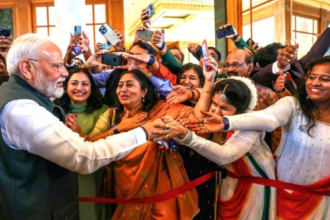Pakistan’s first Hindu woman police officer in Sindh, DSP Manisha Ropeta, hopes her story will inspire other girls from her community to join the police force. Manisha, who hails from Jacobabad, passed the Sindh Public Service Commission exam in 2021, which is quite rare for a progressive middle-class family like hers.
She shared, “I lost my father, who was a businessman in Jacobabad, when I was just 13. Since then, my only brother has always supported and encouraged me to join the police force.” Manisha added that her fellow officers and colleagues respect and appreciate her work.
Manisha Ropeta said, “There may be some gender issues, but I don’t feel isolated, nor does it matter that I am a Hindu woman. Even today, when I wear the police uniform, I feel proud. I hope that girls from my community will be inspired by my story and follow the path I have chosen.” She further explained that joining the police force is a big step because, in Sindh, girls from educated Hindu families usually pursue careers in medicine or teaching.
See here also : shooting-in-usa-4-killed-in-a-school-shooting-in-georgia
There are two types of officers in the Pakistan police force: those who reach higher positions based on experience and those who are appointed after passing the Central Superior Services (CSS) exam. There are very few educated women officers in the Pakistani police. DSP Manisha Ropeta has played a significant role in changing the image of the police force in Sindh by joining the defense sector as an officer.
Manisha also handled the case of the kidnapping attempt on Pakistani actress Nimra Khan. Nimra shared, “In the beginning, people raised doubts, and some dismissed the incident as a minor event on social media and in the news. But DSP Manisha Ropeta handled my case, which helped me stay calm and deal with the situation better.”
Nimra added that talking to an educated woman police officer made her realize that speaking up about the incident publicly was the right decision. Manisha Ropeta believes that being a woman police officer from a minority community was initially a challenge, but it also helped her connect with and support victims of various crimes. “When I took Nimra’s case, I could feel the fear she experienced after that painful incident,” Manisha said.




